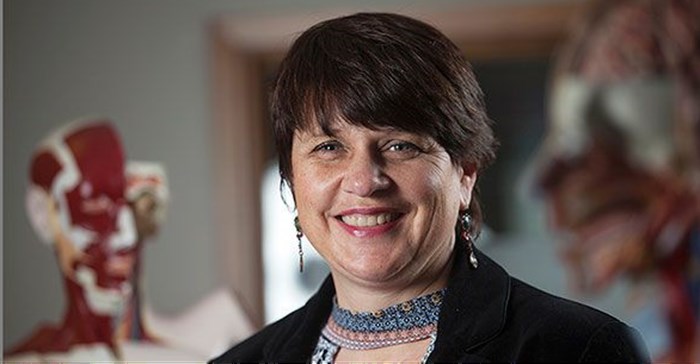Acquiring communication skills will probably occupy an increasingly important position in the medical curriculum of Stellenbosch University (SU).

Dr Elize Archer. Photo: Damien Schumann
Thanks to an SU teaching fellowship, Dr Elize Archer of the Centre of Health Professions Education (CHPE) at the Faculty of Medicine and Health Sciences (FMHS) will look at ways of incorporating this into the curriculum over the next three years.
At the end of 2016, Archer obtained the first doctorate for the CHPE, which was founded in 2006. Furthermore, she was one of only 14 doctoral graduates worldwide who was chosen to present her findings at the annual conference of the Association for Medical Education in Europe in Helsinki, Finland. This event is attended by representatives from approximately 90 countries.
For her doctorate, Archer focused on ways in which patient-centredness is learnt in a medical curriculum.
"Holistic care has always been important to me," says Archer, who comes from a nursing background. She was previously involved in intensive-care training in the private sector, and subsequently she helped to structure the medical curriculum of the Simulation and Clinical Skills Unit at the FMHS. The greater her involvement became in health professions education internationally, the more she became interested in the concept of patient-centredness – hence the topic of her doctoral study.
According to her, literature has shown that the communication skills of medical students often decline as they proceed with their training. Some of them become cynical over time, suffer from burnout or gradually lose empathy. Even though much has been published internationally on this issue, no similar local study has specifically focused on medical studies.
In her investigative study, Archer involved 60 sixth-year medical students in focus groups of six to eight, as well as a few specialists. "I really don’t want to suggest for one moment that medicine is the only scapegoat when it comes to cynicism and poor communication skills," she emphasises. "It's a disease found in all medical professions."
Caring and sharing
For the purposes of her study, Archer divided patient-centredness into two components, namely “caring” and “sharing”. According to her, caring doesn’t only mean that a doctor is listening, but also that patients feel they are heard. “Sharing” points to a shared responsibility. “The patient must be informed, must understand what the condition and/or the treatment involves, and must take ownership of it.” It is actually a paradigm shift in many situations, says Archer, and it requires certain skills on the part of the doctor to conduct this conversation. “But in the end, my study showed that our medical students are not well equipped for this.”
Many factors play a role, including personality, selection criteria, and a complex clinical setting which is not really conducive to patient-centredness. “What do you do when, for instance, you realise you have to spend time with a patient, but as a result you are making things worse for the 60 still waiting in the corridor?”
Furthermore, some students study medicine for the wrong reasons, Archer says frankly. “During the past couple of years many students have told me that they like understanding the human body, that they want to figure out what is wrong with someone, but that they are not interested in hearing about the patient’s daily problems.”
Ironically enough, research shows that the more empathy shown by someone, the more likely that person is to suffer from burnout. That is why some medical students cut themselves off, and in the process may appear emotionally blunted. “But this isn’t fair to the patient or to the medical student,” Archer emphasises. “That is why I and a few other role players are currently investigating whether we can teach them concrete skills, including self-awareness. You have to be able to look after yourself in order to care for others.”
This component does, in fact, receive attention from the first year of study, but becomes neglected in later years when clinical training increases.
Role modelling and norms
Another important aspect is role modelling and norms. “The seniors don’t realise what an incredibly important role they play in this,” says Archer. “That is why a curriculum that is adapted to empower students should go hand-in-hand with staff development. The lecturers must be made aware of their role, and they need to consciously set an example.”
Using simulated patients is one way in which the challenge of assessing communication skills is dealt with internationally. It involves the training of paid volunteers to play the role of a specific patient, for example a diabetic. Based on students’ interaction with these “patients”, the volunteers themselves, or the lecturers who are observing, can provide feedback to the students.
Even though communication is mostly regarded as a soft skill, Archer regards its inclusion in the curriculum as non-negotiable. “The public not only requires more knowledge and skills from doctors, but also the right attitude.”

































